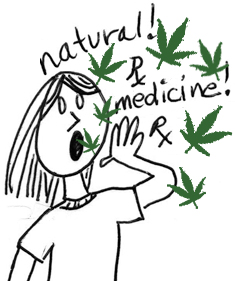Before going much further with my saga on research, let me point out that there are many ways to collect data and make an assumption, and one of these methods are case studies.
case study – n.
The act or an instance of analysing one or more particular cases or case histories with a view to making generalizations.
An example of a case study would be when an oncologist has 100 cancer patients, 35 who smoke pot prior to and during their treatments. 70 patients never smoked pot in their lifetime. Over a period of time he notices and makes record that the 35 patients who smoke cannabis have gone into remission faster, or stayed in remission longer, or had fewer side effects from treatment, or were cancer free, when compared to the other 70 patients. This isn’t necessarily a factual scenario, it’s just my example of a case study. Case study findings will often prompt real scientific research and clinical studies, when it is legal to do so. There are thousands of case studies of cannabis that are encouraging enough in their assumptions that medical professional want to see more real scientific research, but it’s not happening very often in America yet. Slowly, but surely, unfortunately. But with the world at our fingertips now, we DO have lots of anecdotal evidence.
anecdotal – adj.
Based on casual observations or indications rather than rigorous or scientific analysis.
anecdotalist n.
anecdotally adv.
 Anecdotal evidence was admittedly the most compelling evidence that brought me to consider using medical cannabis in the first place, and what led me to research on my own whether or not it might work for me. My story is being told now as anecdotal evidence to those of you who are considering medical cannabis for yourself or a loved one.
Anecdotal evidence was admittedly the most compelling evidence that brought me to consider using medical cannabis in the first place, and what led me to research on my own whether or not it might work for me. My story is being told now as anecdotal evidence to those of you who are considering medical cannabis for yourself or a loved one.
In the form of real stories, anecdotal evidence from real people in all walks of life, cannot and should not be dismissed, and is often as much of a catalyst for scientific research as are case studies. The shear numbers of modern day medical cannabis success stories are finally beginning to refute, (with much success), the propaganda that has persisted for much of the last century, and call for the government to de-classify marijuana as a Schedule 1 drug with no medicinal value. How this evidence can be ignored is beyond my understanding, especially in light of the fact that marijuana was an often prescribed medication prior to the war on cannabis, and only fell off the market after it was taxed out of use in the 1930s, (with much protest from the medical community at the time, I must add).
With or without the blessings of their doctors, people are using cannabis as medicine with outstanding results and in increasing numbers. Are they all lying to justify their preferred method of getting high? Many prohibitionists would have you think so, and New York City Mayor Michael Bloomberg’s offhanded remark that medical marijuana is a myth proves that people in power, (but not necessarily informed people), are using old myths to dictate policy in America. The same thing is happening with SAM, the Smart Approach to Marijuana, so beware of what they say and always check their facts, if they ever present any. You must consider the source with groups like SAM.
I thank God that the anecdotal evidence of real people is beginning to shine through all this clouded judgement, and is shedding light on the true value of a natural herb. As momentum is gained, more people will come forward to tell their stories of how this plant has changed their lives for the better. There is no better evidence in this form than Run from the Cure – The Rick Simpson Story. Watch this, please. It will have a lasting impression, I am sure of it, and you’ll never look at serious illness quite the same again.

Great article right up until you mention Rick Simpson. Then, you lost me… Far better examples out there than someone using a toxic chemical like naptha.
I sure wish people weren’t so quick to criticize. This post was written over 6 years ago in 2014, and back then everyone was calling concentrated cannabis oils “RSO” and “Rick Simpson Oil”. No distinction was made back then. No one in the US was making these oils with naptha anyway because you can’t even by pure naptha here. So many names – Buddha Tears, Phoenix Tears, yada, yada, yada, and what most people understood was the name Rick Simpson Oil. Sure…now it is proper to call it FECO – Full Extract Cannabis Oil.
A lot has changes in 6 years. Hell…back in 2014 so many cannabis products that are very popular now on the market weren’t even known of or available. So lighten up, check dates before you criticize, stay medicated and enjoy yourself.
Excellent article! I particularly liked your definition of ‘anecdotal’. At a Licensed Producers website- under “What we know about the science” they claim that the the evidence of the therapeutic benefits of cannabis are anecdotal at best … and I must say it was disturbing to read that. I very much appreciate this blog and therefore, thank you.